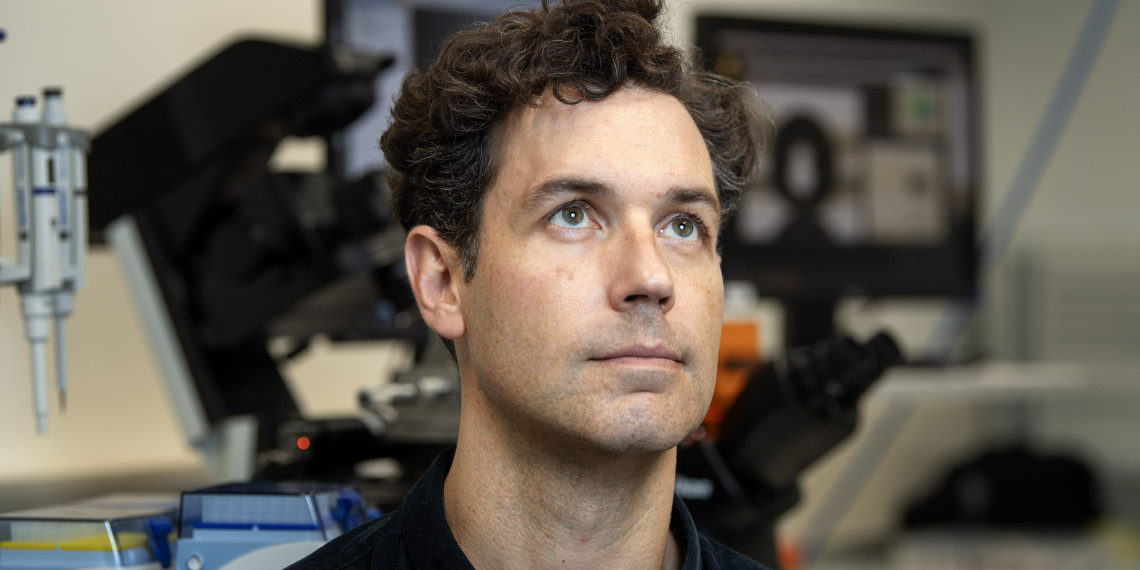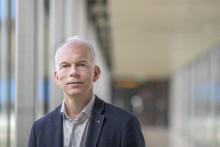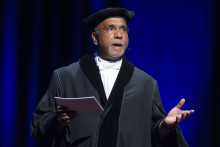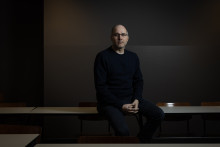Alvaro Marin doesn’t want people to see him as ‘a weird guy in a lab’. By ‘people’ he means everyone but especially the public, the ones outside the university gates. ‘I’d like to make a point about a topic that is not often discussed in academia’, he says. A topic, as he later proclaims himself, that makes him ‘a bit mad’.
Alvaro Marin’s career in a nutshell
2016 – present Associate Professor in Physics of Fluids group, University of Twente
2016 ERC Starting Grant (personal grant worth 1.5 million euros)
2011 – 2016 Researcher, the Institute of Fluid Mechanics and Aerodynamics in the Bundeswehr Universität in Munich (Germany)
2008 – 2011 Postdoc in the Physics of Fluids group, University of Twente
2006 PhD in Fluid Mechanics, Escuela Superior de Ingenieros de Sevilla (Spain)
‘Some of my colleagues are so focused on publishing in prestigious journals, they forget this, but I believe that all scientists - not only good scientists, but even bad scientists - should deliver their findings to the public in an open and accessible way’, says the Associate Professor at Physics of Fluids research group. ‘I’m not talking about open science. Open science should be the bare minimum. I’m talking about reaching out to society. That is the duty of a scientist. It shouldn’t be taken for granted that we live in a society that pays for science and research with taxpayers’ money. We need to show appreciation and make sure that the public trusts us. We have to try to communicate what we’re doing.’
'It might help us to get to a society that doesn’t buy fake news’
‘This topic makes me a bit angry because I see a lot of scientists who seem to live on their own little cloud. They think this system will just perpetuate forever’, continues Marin. But academics shouldn’t only be concerned with the survival of the scientific community, he says. They should worry about survival. ‘If we communicate properly, we can foster a society that is more rational, more informed, and more responsible. If people respect science and scientists, they’ll respect institutions and, by extension, law. I believe it might help us to get to a society that doesn’t buy fake news, doesn’t follow populists, a society in which people don’t refuse to get vaccinated.’
Reaching out to the public is also one of the most joyful parts of his work, says the scientist. ‘I have fun discovering stuff myself, but it’s as much fun to explain it to others’, he says. ‘Being a scientist was definitely not my childhood dream or anything. I started to become interested in science very late in life because I had terrible teachers. I didn’t really understand physics or chemistry. At some point, though, it just all clicked. I realized there was so much in the world to understand. I love to understand complicated stuff. And I want the public to feel the pleasure of understanding.’
‘There are only a few of these moments of pleasure. The rest of the time we are struggling.’
Judging by the passion with which he speaks, it is abundantly clear that Alvaro Marin loves what he does. Even though the word ‘struggle’ comes up several times during the conversation. 'Overall, being an academic is a tough job. There are only a few of these moments of pleasure. The rest of the time we are struggling. It’s a struggle to get funding because there is a lot of competition. It’s a struggle to get students. It’s a struggle to get a stable job at a university. I’m very lucky. I have a lot of friends who loved academia but had to find another way in life.’
The UT scientist is lucky to work with Physics of Fluids, he says. ‘Everything I do happens to be very visually appealing. My everyday work involves beautiful images.’ Marin first studied Fundamental Physics, which included abundant statistical and quantum mechanics, but he found it difficult to connect the ‘beautiful mathematics to reality’, and so he decided to switch focus. ‘I ended up with Physics of Fluids where I work with things you can see, things that you can measure and that relate to everyday life.’
Alvaro Marin’s research in a nutshell
Alvaro Marin’s work revolves around fluids, micro- and nanoparticles, drops and bubbles. He studies what happens inside liquid droplets. For example, he wants to understand what happens when particles are confined inside evaporating droplets. Among the applications of his work, he is studying how the controlled evaporation of droplets containing microparticles can lead to an efficient detection technology for microplastics in water.
In general, Marin’s research relates to drying droplets of complex fluids. For example, he was involved in the project Imaginarium of Tears led by artist Maurice Mikkers. ‘I think that interaction of scientists and artists is really valuable. Interaction with artists can improve how we interact with the world. They can help to make our work more accessible’, says Marin.
In fact, he is now working on another project together with the same artist. ‘Maurice is a crazy guy and he is the first person who managed to put a camera inside a centrifuge’, says the Associate Professor. ‘You can look up The Centrifuge Camera Channel on YouTube. You can place anything inside the machine – like coffee, beer, ketchup, a banana smoothie… And we have been studying the flow inside these tubes in the machine. Thanks to the camera we could see things that we didn’t think should be there. Centrifuging is a very basic component in industry. It’s used everywhere but there is a lot going on inside that we weren’t aware of – and that we found thanks to a collaboration with an artist crazy enough to place a camera inside. I think this is a great example of how to engage the public.’
Besides being fun to watch, as Marin excitedly repeats, his research can lead to serious applications. With his team, the scientist is working on a method to detect microplastics and possibly even nanoplastics. Microplastics pose an increasing threat to human health and the environment, and his work could serve as the first step towards better microplastic management. ‘This could potentially be a gamechanger in how we detect plastics in water’, says the UT scientist.
Continuing his research is the main thing on his mind, says Alvaro Marin. ‘My ambitions? I want to stay in research. I have a lot of things to do, a lot of deadlines, but within those deadlines I have a lot of freedom in my work. I love that about academia. And of course, my dream is to make a substantial contribution – to my field and to society. That is the dream of every scientist. Feeling valued and recognized is a basic human need. We all want to perpetuate ourselves to the future even after we are gone.’








